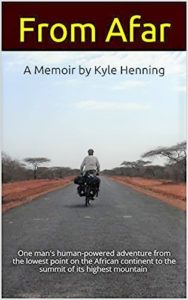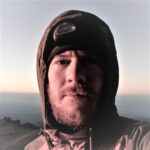Talking to Kyle Henning (Ethiopia)
In 2013, Kyle Henning, a recent PCV in Ethiopia, rode his bike from Lake Assal in Djibouti to Mt. Kilimanjaro in Tanzania to raise funds and public awareness for The New Day Children’s Centre in Bahir Dar, Ethiopia. Called Low2High: Africa, the expedition topped off his Peace Corps tour as an HIV/AIDS PCV in Ethiopia. Kyle is publishing a book about his journey entitled, From Afar, and also has 11 UTube videos of his journey from Dijouti, through Ethiopia, Kenya, and Tanzania. I interviewed Kyle about his Peace Corps tour and his bike trip through East Africa. JC
Kyle, where did you go to college?
I am originally from the Buffalo, NY area. Prior to my Peace Corps service, I studied music at SUNY Fredonia with a focus on string bass. After completing my Peace Corps service, I earned a degree in Homeland Security Studies from Tulane University in New Orleans, LA.
Why did you join the Peace Corps? And why Ethiopia? Did you pick that country?
I joined the Peace Corps for many reasons. I had already served for two years in AmeriCorps, and I wanted to expand my national service overseas. It was the second half of a four-year commitment to volunteering. I did not choose Ethiopia – in 2008 volunteers could not choose their country of service – but I did indicate a preference for Subsaharan Africa when I applied.
What was your assignment?
My assignment was as a Health Economic Development Advisor for HIV/AIDS. It’s a very long title for a volunteer working in public health with a focus on HIV prevention and treatment. I lived in a beautiful city in northwestern Ethiopia called Bahir Dar.
What did you learn from your years in Ethiopia?
For me, the Peace Corps was a learning experience in self-reliance. My AmeriCorps service had been team-focused, but the Peace Corps was much more of an individual endeavor. The experience was shaped by how well I learned the language, the relationships I built, and learning not to pass judgment onto things I didn’t fully understand. I had more takeaways from the cross-cultural experience than learning technical knowledge.
Why this journey in Ethiopia after your tour? What was your route and why that route?
From reading the book Into Thin Air by Jon Krakauer, I learned about a Swedish mountaineer named Goran Kropp who cycled from his home to the base of Mount Everest, then climbed to the summit. It was an inspiring tale that I wanted to replicate in some way. When I was assigned to Ethiopia, I decided to travel after my service in the same manner – cycling solo to Kilimanjaro and trekking to the summit. The other extreme elevation point on the continent, Lake Assal, is just over the border in Djibouti, so I started my trip on its shores so I could go from the absolute lowest point of elevation to the highest using only my own body for momentum.
My initial route included nine countries – Djibouti, Somaliland, Ethiopia, Kenya, Uganda, the Democratic Republic of Congo, Rwanda, Burundi, and Tanzania. Mechanical failures, visa time limits, security issues, and life commitments forced me to take a more direct route to the mountain – Djibouti, Ethiopia, Kenya, and Tanzania. Despite being a much shorter route, it still took 68 days from start to finish, covering more than 3,000 kilometers.
What was your job and experience like in Ethiopia?
My main assignment was working with an NGO called OSSA – Organization for Social Services for AIDS. They have projects in and around Bahir Dar to help people get tested for HIV, get access to antiretroviral drugs and nutrition support, help HIV-positive people get jobs, and give the public information about the disease to help reduce discrimination. My role focused on coordinating their work with other government agencies and NGO’s around the city so that people knew where to get services.
Have you been back to Dahir Dar since you left?
Yes – several times. I lived and worked in Addis Ababa recently and was able to visit Bahir Dar.
You were raising funds for the New Day Children’s Centre in Bahir Dar. What is that? Is it still functioning?
The New Days Children’s Centre is a nonprofit in Bahr Dar that provides everyday essentials to children, helping them put an end to their life on the streets and to complete their education in a safe environment. I taught Life Skills classes to the kids there as a secondary project. It is still functioning, and its website provides regular updates on its activities:
As I read about your journey you thought that isolation would be the toughest job to handle. Was it?
Isolation was a big challenge while cycling to Kilimanjaro since I was traveling alone. Luckily, I was able to see friends along the way in Ethiopia and make some new ones further south. Traveling alone forced me to talk with people when I stopped to rest, which I probably would have done less often if I had a traveling partner. Personal security, physical exhaustion, and bike mechanical failures ended up being equally, if not more, challenging.
You have videos of your journey. Tell us how you did that and where we can watch those videos.
I recorded about 100 hours of footage during my journey on a camcorder I borrowed from another volunteer. I planned to return it after the trip, but it was nearly destroyed by dust, ice, and more than one tumble down the asphalt. This was a time before GoPros, and the camera did not hold up to the elements.
Filming myself sometimes required setting up the tripod to get the shot I wanted, cycling through the frame, and then doubling back to retrieve the camera. This added quite a bit of work, but speaking to the camera became a way to talk through my decision-making process, record my thoughts in real-time, and document my surroundings. I’m glad I made the effort to film as much as I did since it helped me put my mind back into that period of my life as I wrote the book.
I have edited one video for each chapter of the book. They provide a glimpse into the journey, but there was a lot that I couldn’t film, so the full story is told in the pages of From Afar. There are 11 videos in total, and they are being released on YouTube a few times per week between now and the book launch. The best way to watch them is the YouTube playlist called From Afar by Kyle Henning:
https://www.youtube.com/playlist?list=PLtq-xU74dnn7GrradbBmeoiw_wwNykZe6
Since your trip in 2011 what have you been doing in terms of a career?
I am a Foreign Service Officer, so I work in US embassies overseas. This is how I got to live and work in Ethiopia again. I did not go directly from the Peace Corps to the Foreign Service, though, and struggled to find work after my service. Since completing my trip in 2011 I’ve worked as a roofer, mountain biking guide, climbing instructor, writer, and program manager for the American Red Cross. I also completed graduate school and served as a Peace Corps Response Volunteer in the Philippines.
One final question. When is your book being published and what is the best way to buy a copy?
The book is called From Afar and is self-published on Amazon for Kindle and in paperback. Both versions will be released on May 21. The Kindle version is available for pre-order now at:
https://www.amazon.com/dp/B0946CXP7Q?ref_=pe_3052080_276849420

John, I loved the interview. I’ve ordered the book which sounds like it’s going to be an amazing adventure. I also checked out the YouTube videos and the second one with the soldiers would have had me turning back. However, since I am that one person in millions who cannot ride a bike I probably would still be at the edge of the lake. I am going to continue to watch at least one video per day. I was hoping to learn more about the center but it the latest update is from 2020. I’m hoping they are still doing fine. I can’t wait to start reading. An amazing young man with an incredible story to tell! And from his circuitous path to today, I think there will be more stories to look forward too.
John, thanks for bringing this to our attention. I watched the first video. He’s a brave adventurer in the Peace Corps tradition. Glad to know that like me, he wound up translating his experience into the Foreign Service. Good luck, Kyle.
Really looking forward to reading the book. I watched the video where he goes from Dire Dawa up to Harar, where I lived 56 years ago. The two things that amazed me were, one, how much it had not changed, especially the old city in Harar; and two, how the road from Dire Dawa to Harar was now paved. It was all dirt back in the day and a bike could never have made it up there. Can’t wait to see the rest of the videos.